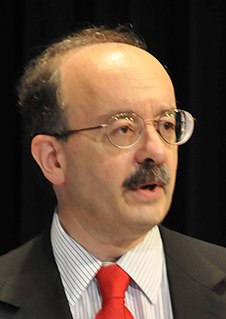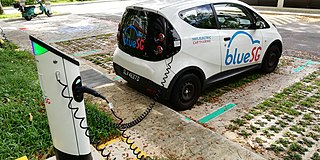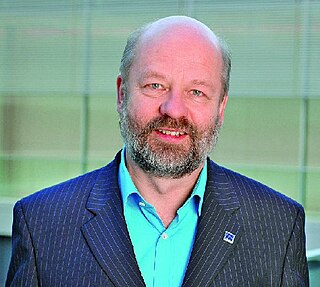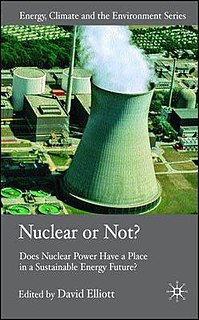Related Research Articles

A non-renewable resource is a natural resource that cannot be readily replaced by natural means at a pace quick enough to keep up with consumption. An example is carbon-based fossil fuels. The original organic matter, with the aid of heat and pressure, becomes a fuel such as oil or gas. Earth minerals and metal ores, fossil fuels and groundwater in certain aquifers are all considered non-renewable resources, though individual elements are always conserved.

Amory Bloch Lovins is an American writer, physicist, and former chairman/chief scientist of the Rocky Mountain Institute. He has written on energy policy and related areas for four decades, and served on the US National Petroleum Council, an oil industry lobbying group, from 2011 to 2018.

Energy development is the field of activities focused on obtaining sources of energy from natural resources. These activities include production of renewable, nuclear, and fossil fuel derived sources of energy, and for the recovery and reuse of energy that would otherwise be wasted. Energy conservation and efficiency measures reduce the demand for energy development, and can have benefits to society with improvements to environmental issues.
A green economy is an economy that aims at reducing environmental risks and ecological scarcities, and that aims for sustainable development without degrading the environment. It is closely related with ecological economics, but has a more politically applied focus. The 2011 UNEP Green Economy Report argues "that to be green, an economy must not only be efficient, but also fair. Fairness implies recognizing global and country level equity dimensions, particularly in assuring a Just Transition to an economy that is low-carbon, resource efficient, and socially inclusive."

Clean technology, in short cleantech, is any process, product, or service that reduces negative environmental impacts through significant energy efficiency improvements, the sustainable use of resources, or environmental protection activities. Clean technology includes a broad range of technology related to recycling, renewable energy, information technology, green transportation, electric motors, green chemistry, lighting, grey water, and more. Environmental finance is a method by which new clean technology projects can obtain financing through the generation of carbon credits. A project that is developed with concern for climate change mitigation is also known as a carbon project.
Professor Andrew Blakers is Director of the Australian National University Centre for Sustainable Energy Systems, which employs 60 staff. He is responsible for several innovations in solar energy photovoltaic technology, including "Sliver cells". Blakers has secured many research grants and won several awards.

Mark Diesendorf is an Australian academic and environmentalist, known for his work in sustainable development and renewable energy. He currently teaches environmental studies at the University of New South Wales, Australia. He was formerly professor of environmental science and founding director of the Institute for Sustainable Futures at the University of Technology, Sydney and before that a principal research scientist with CSIRO, where he was involved in early research on integrating wind power into electricity grids. His most recent book is Sustainable Energy Solutions for Climate Change.

Renewable energy commercialization involves the deployment of three generations of renewable energy technologies dating back more than 100 years. First-generation technologies, which are already mature and economically competitive, include biomass, hydroelectricity, geothermal power and heat. Second-generation technologies are market-ready and are being deployed at the present time; they include solar heating, photovoltaics, wind power, solar thermal power stations, and modern forms of bioenergy. Third-generation technologies require continued R&D efforts in order to make large contributions on a global scale and include advanced biomass gasification, hot-dry-rock geothermal power, and ocean energy. As of 2012, renewable energy accounts for about half of new nameplate electrical capacity installed and costs are continuing to fall.

Jeremy Leggett is a British social entrepreneur and writer. He founded and was a board director of Solarcentury from 1997 to 2020, an international solar solutions company, and founded and was chair of SolarAid, a charity funded with 5% of Solarcentury's annual profits that helps solar-lighting entrepreneurs get started in Africa (2006–2020). SolarAid owns a retail brand SunnyMoney that was for a time Africa's top-seller of solar lighting, having sold well over a million solar lights, all profits recycled to the cause of eradicating the kerosene lantern from Africa.

Greenhouse Solutions with Sustainable Energy is a 2007 book by Australian academic Mark Diesendorf. The book puts forward a set of policies and strategies for implementing the most promising clean energy technologies by all spheres of government, business and community organisations. Greenhouse Solutions with Sustainable Energy suggests that a mix of efficient energy use, renewable energy sources and natural gas offers a clean and feasible energy future for Australia.

A green-collar worker is a worker who is employed in an environmental sectors of the economy. Environmental green-collar workers satisfy the demand for green development. Generally, they implement environmentally conscious design, policy, and technology to improve conservation and sustainability. Formal environmental regulations as well as informal social expectations are pushing many firms to seek professionals with expertise with environmental, energy efficiency, and clean renewable energy issues. They often seek to make their output more sustainable, and thus more favorable to public opinion, governmental regulation, and the Earth's ecology.

Fossil fuel phase-out is the gradual reduction of the use and production of fossil fuels to zero. It is part of the ongoing renewable energy transition. Current efforts in fossil fuel phase-out involve replacing fossil fuels with sustainable energy sources in sectors such as transport and heating. Alternatives to fossil fuels include electrification, green hydrogen and biofuel. Phase-out policies include both demand-side and supply-side constraints. Whereas demand-side approaches seek to reduce fossil-fuel consumption, supply-side initiatives seek to constraint production to accelerate the pace of energy transition and reduction in emissions.

Hans-Josef Fell was a member of the German Parliamentary Group Alliance 90/ the Greens from 1998 to 2013. He served as spokesman on energy for the Alliance 90/The Greens parliamentary group, a member of the Environmental Protection Committee, substitute member of the Committee on Economics and Technology and substitute member of the Defence Committee. Together with Hermann Scheer, he authored the 2000 draft of the Renewable Energy Sources Act, establishing the foundation for the technology developments in photovoltaic, biogas, wind power and geothermal energy in Germany. Fell is founder and president of the Energy Watch Group and an internationally renowned energy and climate change advisor, author and speaker.

Nuclear or Not? Does Nuclear Power Have a Place in a Sustainable Energy Future? is a 2007 book edited by Professor David Elliott. The book offers various views and perspectives on nuclear power. Authors include:

Sustainable development in Scotland has a number of distinct strands. The idea of sustainable development was used by the Brundtland Commission which defined it as development that "meets the needs of the present without compromising the ability of future generations to meet their own needs." At the 2005 World Summit it was noted that this requires the reconciliation of environmental, social and economic demands - the "three pillars" of sustainability. These general aims are being addressed in a diversity of ways by the public, private, voluntary and community sectors in Scotland.
Whether nuclear power should be considered a form of renewable energy is an ongoing subject of debate. Statutory definitions of renewable energy usually exclude many present nuclear energy technologies, with the notable exception of the state of Utah. Dictionary-sourced definitions of renewable energy technologies often omit or explicitly exclude mention of nuclear energy sources, with an exception made for the natural nuclear decay heat generated within the Earth.

Barry William Brook is an Australian scientist. He is an ARC Australian Laureate Professor and Chair of Environmental Sustainability at the University of Tasmania in the Faculty of Science, Engineering & Technology. He was formerly an ARC Future Fellow in the School of Earth and Environmental Sciences at the University of Adelaide, Australia, where he held the Sir Hubert Wilkins Chair of Climate Change from 2007 to 2014. He was also Director of Climate Science at the Environment Institute.

Benjamin K. Sovacool is an American academic who is director of the Institute for Sustainable Energy at Boston University as well as Professor of Earth and Environment at Boston University. He was formerly Director of the Danish Center for Energy Technology at the Department of Business Development and Technology and a professor of social sciences at Aarhus University. He is also professor of energy policy at the University of Sussex, where he formerly directed the Center on Innovation and Energy Demand and the Sussex Energy Group. He has written on energy policy, environmental issues, and science and technology policy. Sovacool is editor-in-chief of Energy Research & Social Science.
Ken Baldwin is professor of physics at the Australian National University (ANU). He is the deputy director of the Research School of Physics and Engineering and the director of the [http://energy.anu.edu.au/ ANU Energy Change Institute].
References
- 1 2 "Prof David Elliott". The Faculty of Mathematics, Computing and Technology. The Open University. Retrieved 12 September 2016.
- ↑ Nuclear Or Not?